Archaeologists have uncovered a monumental entryway and corridor with arches and frescoes that led into the courtyard of King Herod’s hilltop palace complex, known as Herodium, in the Palestinian West Bank.
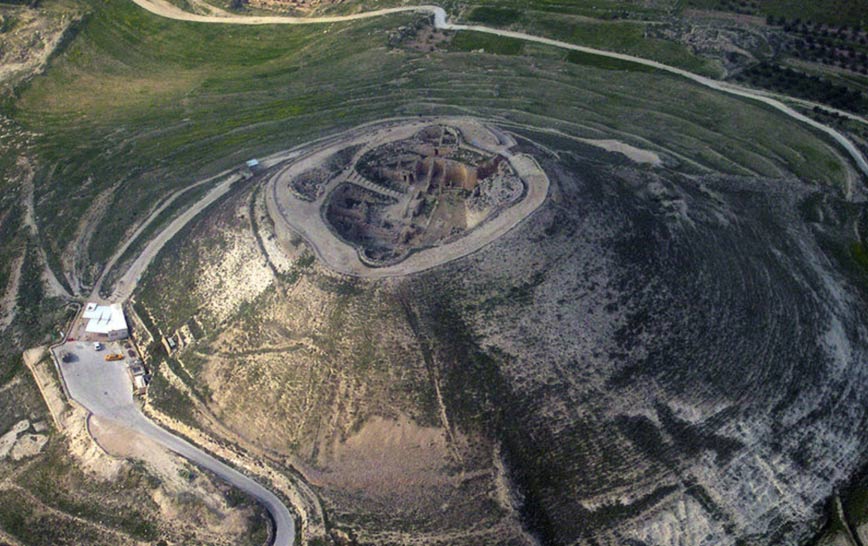
King Herod ruled Judea under the auspices of Rome when Jesus was born and attempted to have the baby Jesus killed when the Magi came to worship him. The Magi had told Herod the expected savior’s coming was announced by the rising of a bright star, the New Testament says. Jesus’ family fled to Egypt to escape Herod.
Archaeologists from Hebrew University of Jerusalem’s Institute of Archaeology, who have been excavating Herod’s palace for years, found exits to tunnels that were used by Jewish rebels in the second century.
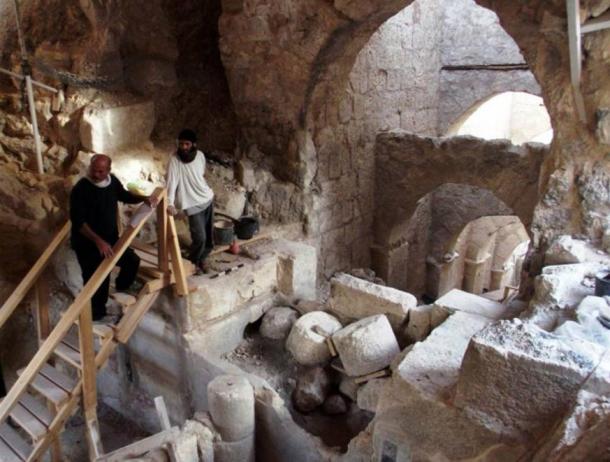 Herodian Palace entry complex
Herodian Palace entry complex
Palace entry complex discovered at Herodian Hilltop Palace by Hebrew University archaeologists (Credit: Hebrew University of Jerusalem).
This is the King Herod about whom his master, Roman Emperor Augustus, said, “I would rather be Herod’s pig than Herod’s son.” Herod had his own sons and some of his wives and a brother-in-law killed and also ordered boys in Bethlehem under age 2 slain in retaliation for the Magi’s role in Jesus’ escape.
“Herod's slaughter of the infant boys as accounted in the New Testament vividly reflects the pathological character of the king. He murdered members of his own family yet scrupulously observed Mosaic dietary laws and would eat no pork,” Bible-History.com says.
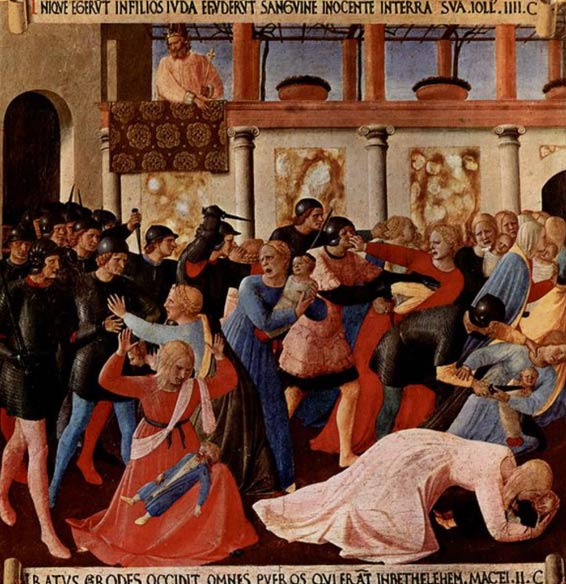 Herod's slaughter of infant boys
Herod's slaughter of infant boys
Herod's slaughter of infant boys. 'Massacre of the Innocents' by Fra Angelico, c 1450 AD. (Wikimedia Commons)
However, there is a discrepancy between scriptures and recorded history. King Herod died in 4 B.C., four years before the Bible says Jesus was born.
King Herod built great cities and fortresses, was a patron of Greek culture in Judea and was a formidable warrior in battle, but he was a hated tyrant.
Hebrew University’s news website describes what the archaeologists found: 'The main feature of the entryway is an impressive corridor with a complex system of arches spanning its width on three separate levels These arches buttressed the corridor’s massive side-walls, allowing the king and his entourage direct passage into the Palace Courtyard. Thanks to the supporting arches, the 20-meter (65 feet) long and 6-meter (20 feet) wide corridor has been preserved to a height of 20 meters.'
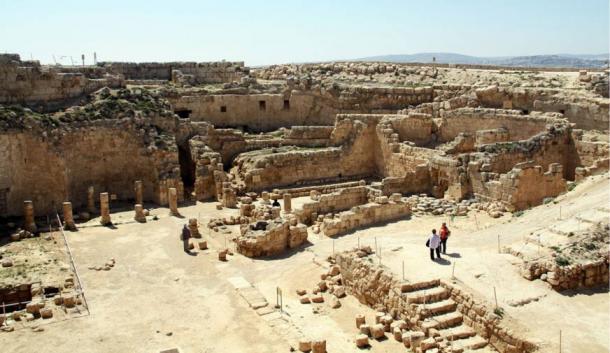 Herodium excavations
Herodium excavations
Herodium excavations (Wikimedia Commons)
Archaeologists speculate the entryway was part of Herod's plan to transform Herodium into a volcano-shaped hill. They concluded the entrance was never used because it became redundant. Herod determined to convert the palace into a burial mound when he became sick and knew he would die. The corridor and most other structures on the hill were filled in, including a theater discovered in 2008. One edifice was left: Herod’s tomb.
The team found evidence of the Bar Kokhba Revolt period of 132-136 A.D. They found tunnels on the site dug by rebels to wage guerrilla war against the Roman occupiers. Wooden beams support the tunnels, which exited the hilltop palace through the corridor’s walls. Openings were hidden in the corridor just recently unearthed.
After excavations are complete, visitors to the Herodium hilltop fortress will be able to enter it the same way Herod did 2,000 years ago: through the arched corridor, into the courtyard. Officials also plan to allow direct access to the palace on the top of the hill from structures on the slope, such as the royal theater and the mausoleum via a monumental stairway previously unearthed.
Bible-History.com’s article about King Herod, called 'the Great,' says though he was Jewish he was disliked by Jews of the time. Later he was considered a great enemy of Christians and Jews for his attempt to assassinate the newborn Jesus and for killing the young boys.
'Although Herod had exceptional leadership skills, he was extremely disliked by the Jews. His attitude toward the Maccabean dynasty, to which he was related by marriage, along with his insolence and cruelty, angered them all the more. He even had his brother-in-law and several of his wives and sons executed,' Bible History says.
Herod Antipas was King Herod’s son. Herod Antipas ruled Galilee during Jesus' life and at the time of his crucifixion and death. He has been accused of conspiring to kill Jesus, but there is little or no historical or biblical support for this.

King Herod ruled Judea under the auspices of Rome when Jesus was born and attempted to have the baby Jesus killed when the Magi came to worship him. The Magi had told Herod the expected savior’s coming was announced by the rising of a bright star, the New Testament says. Jesus’ family fled to Egypt to escape Herod.
Archaeologists from Hebrew University of Jerusalem’s Institute of Archaeology, who have been excavating Herod’s palace for years, found exits to tunnels that were used by Jewish rebels in the second century.
 Herodian Palace entry complex
Herodian Palace entry complexPalace entry complex discovered at Herodian Hilltop Palace by Hebrew University archaeologists (Credit: Hebrew University of Jerusalem).
This is the King Herod about whom his master, Roman Emperor Augustus, said, “I would rather be Herod’s pig than Herod’s son.” Herod had his own sons and some of his wives and a brother-in-law killed and also ordered boys in Bethlehem under age 2 slain in retaliation for the Magi’s role in Jesus’ escape.
“Herod's slaughter of the infant boys as accounted in the New Testament vividly reflects the pathological character of the king. He murdered members of his own family yet scrupulously observed Mosaic dietary laws and would eat no pork,” Bible-History.com says.
 Herod's slaughter of infant boys
Herod's slaughter of infant boysHerod's slaughter of infant boys. 'Massacre of the Innocents' by Fra Angelico, c 1450 AD. (Wikimedia Commons)
However, there is a discrepancy between scriptures and recorded history. King Herod died in 4 B.C., four years before the Bible says Jesus was born.
King Herod built great cities and fortresses, was a patron of Greek culture in Judea and was a formidable warrior in battle, but he was a hated tyrant.
Hebrew University’s news website describes what the archaeologists found: 'The main feature of the entryway is an impressive corridor with a complex system of arches spanning its width on three separate levels These arches buttressed the corridor’s massive side-walls, allowing the king and his entourage direct passage into the Palace Courtyard. Thanks to the supporting arches, the 20-meter (65 feet) long and 6-meter (20 feet) wide corridor has been preserved to a height of 20 meters.'
 Herodium excavations
Herodium excavationsHerodium excavations (Wikimedia Commons)
Archaeologists speculate the entryway was part of Herod's plan to transform Herodium into a volcano-shaped hill. They concluded the entrance was never used because it became redundant. Herod determined to convert the palace into a burial mound when he became sick and knew he would die. The corridor and most other structures on the hill were filled in, including a theater discovered in 2008. One edifice was left: Herod’s tomb.
The team found evidence of the Bar Kokhba Revolt period of 132-136 A.D. They found tunnels on the site dug by rebels to wage guerrilla war against the Roman occupiers. Wooden beams support the tunnels, which exited the hilltop palace through the corridor’s walls. Openings were hidden in the corridor just recently unearthed.
After excavations are complete, visitors to the Herodium hilltop fortress will be able to enter it the same way Herod did 2,000 years ago: through the arched corridor, into the courtyard. Officials also plan to allow direct access to the palace on the top of the hill from structures on the slope, such as the royal theater and the mausoleum via a monumental stairway previously unearthed.
Bible-History.com’s article about King Herod, called 'the Great,' says though he was Jewish he was disliked by Jews of the time. Later he was considered a great enemy of Christians and Jews for his attempt to assassinate the newborn Jesus and for killing the young boys.
'Although Herod had exceptional leadership skills, he was extremely disliked by the Jews. His attitude toward the Maccabean dynasty, to which he was related by marriage, along with his insolence and cruelty, angered them all the more. He even had his brother-in-law and several of his wives and sons executed,' Bible History says.
Herod Antipas was King Herod’s son. Herod Antipas ruled Galilee during Jesus' life and at the time of his crucifixion and death. He has been accused of conspiring to kill Jesus, but there is little or no historical or biblical support for this.
- fonte: @edisonmariotti #edisonmariotti: http://www.ancient-origins.net/news-history-archaeology/archaeologists-unearth-huge-entryway-herods-020147#sthash.F4yQsvGi.dpuf
Archaeologists unearth huge entryway with frescoes and rebel tunnels in Herod's palace
Archaeologists
have uncovered a monumental entryway and corridor with arches and
frescoes that led into the courtyard of King Herod’s hilltop palace
complex, known as Herodium, in the Palestinian West Bank.
King Herod ruled Judea under the auspices of Rome when Jesus was born and attempted to have the baby Jesus killed when the Magi came to worship him. The Magi had told Herod the expected savior’s coming was announced by the rising of a bright star, the New Testament says. Jesus’ family fled to Egypt to escape Herod.
Archaeologists from Hebrew University of Jerusalem’s Institute of Archaeology, who have been excavating Herod’s palace for years, found exits to tunnels that were used by Jewish rebels in the second century.

“Herod's slaughter of the infant boys as accounted in the New Testament vividly reflects the pathological character of the king. He murdered members of his own family yet scrupulously observed Mosaic dietary laws and would eat no pork,” Bible-History.com says.

King Herod built great cities and fortresses, was a patron of Greek culture in Judea and was a formidable warrior in battle, but he was a hated tyrant.
Hebrew University’s news website describes what the archaeologists found: 'The main feature of the entryway is an impressive corridor with a complex system of arches spanning its width on three separate levels These arches buttressed the corridor’s massive side-walls, allowing the king and his entourage direct passage into the Palace Courtyard. Thanks to the supporting arches, the 20-meter (65 feet) long and 6-meter (20 feet) wide corridor has been preserved to a height of 20 meters.'

The team found evidence of the Bar Kokhba Revolt period of 132-136 A.D. They found tunnels on the site dug by rebels to wage guerrilla war against the Roman occupiers. Wooden beams support the tunnels, which exited the hilltop palace through the corridor’s walls. Openings were hidden in the corridor just recently unearthed.
After excavations are complete, visitors to the Herodium hilltop fortress will be able to enter it the same way Herod did 2,000 years ago: through the arched corridor, into the courtyard. Officials also plan to allow direct access to the palace on the top of the hill from structures on the slope, such as the royal theater and the mausoleum via a monumental stairway previously unearthed.
Bible-History.com’s article about King Herod, called 'the Great,' says though he was Jewish he was disliked by Jews of the time. Later he was considered a great enemy of Christians and Jews for his attempt to assassinate the newborn Jesus and for killing the young boys.
'Although Herod had exceptional leadership skills, he was extremely disliked by the Jews. His attitude toward the Maccabean dynasty, to which he was related by marriage, along with his insolence and cruelty, angered them all the more. He even had his brother-in-law and several of his wives and sons executed,' Bible History says.
Herod Antipas was King Herod’s son. Herod Antipas ruled Galilee during Jesus' life and at the time of his crucifixion and death. He has been accused of conspiring to kill Jesus, but there is little or no historical or biblical support for this.
King Herod ruled Judea under the auspices of Rome when Jesus was born and attempted to have the baby Jesus killed when the Magi came to worship him. The Magi had told Herod the expected savior’s coming was announced by the rising of a bright star, the New Testament says. Jesus’ family fled to Egypt to escape Herod.
Archaeologists from Hebrew University of Jerusalem’s Institute of Archaeology, who have been excavating Herod’s palace for years, found exits to tunnels that were used by Jewish rebels in the second century.

Palace entry complex discovered at Herodian
Hilltop Palace by Hebrew University archaeologists (Credit: Hebrew
University of Jerusalem).
This is the King Herod about whom his master, Roman Emperor Augustus,
said, “I would rather be Herod’s pig than Herod’s son.” Herod had his
own sons and some of his wives and a brother-in-law killed and also
ordered boys in Bethlehem under age 2 slain in retaliation for the
Magi’s role in Jesus’ escape.“Herod's slaughter of the infant boys as accounted in the New Testament vividly reflects the pathological character of the king. He murdered members of his own family yet scrupulously observed Mosaic dietary laws and would eat no pork,” Bible-History.com says.

Herod's slaughter of infant boys. 'Massacre of the Innocents' by Fra Angelico, c 1450 AD. (Wikimedia Commons)
However, there is a discrepancy between scriptures and recorded
history. King Herod died in 4 B.C., four years before the Bible says
Jesus was born.King Herod built great cities and fortresses, was a patron of Greek culture in Judea and was a formidable warrior in battle, but he was a hated tyrant.
Hebrew University’s news website describes what the archaeologists found: 'The main feature of the entryway is an impressive corridor with a complex system of arches spanning its width on three separate levels These arches buttressed the corridor’s massive side-walls, allowing the king and his entourage direct passage into the Palace Courtyard. Thanks to the supporting arches, the 20-meter (65 feet) long and 6-meter (20 feet) wide corridor has been preserved to a height of 20 meters.'

Herodium excavations (Wikimedia Commons)
Archaeologists speculate the entryway was part of Herod's plan to
transform Herodium into a volcano-shaped hill. They concluded the
entrance was never used because it became redundant. Herod determined to
convert the palace into a burial mound when he became sick and knew he
would die. The corridor and most other structures on the hill were
filled in, including a theater discovered in 2008. One edifice was left:
Herod’s tomb.The team found evidence of the Bar Kokhba Revolt period of 132-136 A.D. They found tunnels on the site dug by rebels to wage guerrilla war against the Roman occupiers. Wooden beams support the tunnels, which exited the hilltop palace through the corridor’s walls. Openings were hidden in the corridor just recently unearthed.
After excavations are complete, visitors to the Herodium hilltop fortress will be able to enter it the same way Herod did 2,000 years ago: through the arched corridor, into the courtyard. Officials also plan to allow direct access to the palace on the top of the hill from structures on the slope, such as the royal theater and the mausoleum via a monumental stairway previously unearthed.
Bible-History.com’s article about King Herod, called 'the Great,' says though he was Jewish he was disliked by Jews of the time. Later he was considered a great enemy of Christians and Jews for his attempt to assassinate the newborn Jesus and for killing the young boys.
'Although Herod had exceptional leadership skills, he was extremely disliked by the Jews. His attitude toward the Maccabean dynasty, to which he was related by marriage, along with his insolence and cruelty, angered them all the more. He even had his brother-in-law and several of his wives and sons executed,' Bible History says.
Herod Antipas was King Herod’s son. Herod Antipas ruled Galilee during Jesus' life and at the time of his crucifixion and death. He has been accused of conspiring to kill Jesus, but there is little or no historical or biblical support for this.
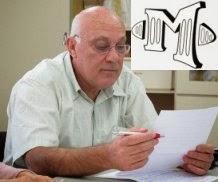

Nenhum comentário:
Postar um comentário